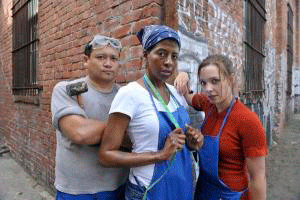|
The common thread is Sofia (Lisa Hori-Garcia), a pregnant garment worker at Peaceweavers, the recently rebranded Jenkins Clothing factory now specializing in "New Age urban hemp wear." When her touchy-feely, aphorism-spouting boss Ernesto Jenkins (Rotimi Agbabiaka) decides to move the factory to Tibet to cut costs, she and the other workers wind up occupying the factory almost accidentally.
Sofia has a sudden fit of pain, flails around and falls to the floor. She insists it's not labor pains, but it's never clear what the fits are about. Regardless, it turns into an impromptu sit-down strike, and the workers drive Ernesto out and occupy the factory. Sofia tells the story of a similar occupation she was part of in the Posibilidad barrio in her native Buenos Aires. From then on, we go back and forth between the two stories until the textiles hit the fan.
Although Nina Ball's compact set of a brick-walled factory interior doesn't change from one location to another, there's never any danger of losing track of where we are. Between Michael Gene Sullivan's entertaining script and the cast's deft performances, the characters are distinct and memorable throughout. The actors continually quick-change between Emilica Sun Beahm's bright costumes to reenter as somebody else in former troupe member Wilma Bonet's sharp staging. Bonet and the cast clearly know the ropes and go at the production like a well-oiled machine.
The show opens with a marvelous tango choreographed by Bonet, with retro-snazzy couples in color-coordinated dresses and suits. One couple becomes the anguished lovers in the telenovela Sofia and her coworkers watch obsessively during lunch breaks. Curmudgeonly old-timer Joe (Sullivan) tries to get them to wake up and organize because a wave of layoffs is coming, but nobody listens at first.
Agbabiaka is hilarious as the unctuous Ernesto, who tries to convince laid-off workers he's doing them a favor by releasing them to find their bliss. Maggie Mason does villainous double duty as Ms. Gachs, the downsizing corporate suit from Jenkins Clothing International, and as the fiendish Argentine mill owner El Patron, who skips town with all the money and leaves the mill to collapse behind him. Brian M. Rivera is charming as Manny, the shy Filipino security guard, and Indelecio, Sofia's strapping, too-good-to-be-true lover back in Argentina.
Velina Brown is a force to be reckoned with as Sofia's Mama Claudia, who leads the worker revolt in Posibilidad but keeps getting sidetracked into squabbles with Indelecio over the rival soccer teams they support. (The lovers have to convince her they're just sneaking off for sex, not to root for his team.) Brown also plays the no-nonsense Donella, who argues with Joe over the changes he wants to implement, with Sofia in the middle as the swing vote. Will Peaceweavers follow the example of worker-run factories in Latin America and strike up alliances with other collectives, or will it be a collective in name only, beholden to the same banks, stockholders and multinational corporations as before?
Pat Moran's songs take on an appropriately Latin flavor for this show, notwithstanding Ernest's amusing reggae ditty about "balancing my chi with the needs of shareholders" or Joe's defeatist gospel number about settling for small victories. The folky anthem "Esta es Nuestra Lucha" isn't quite as stirring as intended, the harmonies a bit tentative around Brown's fiery lead.
It's a lot of story to pack into 90 minutes. The mostly satisfying resolution feels rushed, but it's a lot of fun getting there, and the audience has a great time hissing the capitalists and cheering the workers. Actionable information is available onsite if you're inspired to support your local worker-owned collectives, and "Posibilidad" demonstrates yet again that the Mime Troupe is one well worth supporting.
|
 Factory workers, portrayed by (from left) Brian M. Rivera, Velina Brown and Maggie Mason, find themselves in a takeover in San Francisco Mime Troupe's Posibilidad.
(Provided by Erica Lewis)
Factory workers, portrayed by (from left) Brian M. Rivera, Velina Brown and Maggie Mason, find themselves in a takeover in San Francisco Mime Troupe's Posibilidad.
(Provided by Erica Lewis)
